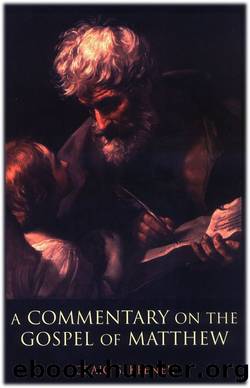The Gospel of Matthew by Keener Craig S

Author:Keener, Craig S. [Keener, Craig S.]
Language: eng
Format: epub
Publisher: Wm. B. Eerdmans Publishing Co.
Published: 2009-07-23T16:00:00+00:00
* * *
Excursus: Prostitution
For modern readers familiar with the Christian condemnation of prostitution as sin, the inclusion of prostitutes with "tax gatherers" in a category of sinners is not surprising (see comment on 9:9 for tax gatherers). This familiarity should not lead us to neglect a survey of associations prostitution would suggest in an ancient Mediterranean context. Although some rabbinic accounts of prostitutes in Palestine suggest foreigners (e.g., Sifre Num. 115.5.7; b. Menah. 44a; earlier, e.g., Prov 2:16; 5:20; 22:14), prostitutes also existed in Jerusalem in the Second Temple period if Ps. Sol. 2:11 is intended literally. Ilan 1996: 214-21 links both foreign and Jewish prostitutes with Jewish clients; Tannaim seem to have emphasized and resented especially the foreign ones (Goodman 1983: 60).
Scripture forbade Jewish practice of prostitution (Deut 23:17), though it reports that it occurred (e.g., Gen 38:15-16). Jewish teachers generally resented prostitution as immoral and dangerous (Sir 9:6; 19:2; 41:20; Jos. Ant. 4.206; Sib. Or. 5.3 88), 147 and as a primarily Gentile practice (e.g., 2 Macc 6:4; ARN 48, §132). Unattested in other Jewish texts, Philo's claim that prostitution was a capital offense in the law (Jos. 43; Spec. Leg. 3.51) appears to be idiosyncratic, an apologetic strategy (Belkin 1940: 256).
Many Gentiles also regarded prostitution as shameful (Diod. Sic. 12.21.2;
Artem. Oneir. 1.78), foolish (Muson. Ruf. Fr. 12, On Sexual Indulgence in Malherbe
1986: 153; Plut. Educ. 7, Mor. 5C; Diog. Ep. 44; Diog. Laert. 6.2.61, 66), and hurtful (Cato collection of distichs 25; Dio Chrys. Or. 7.133-37; Ward 1990: 286). Nevertheless, even moralists regarded prostitution as a better outlet for passion than adultery (Hor. Sat. 2.7.46-47; Greek Anthol. 7.403; Harrell 1967: 35), some philosophers regarded prejudices against prostitution as merely culturally based (Sext. Emp. Pyrrh. 3.201; Diog. Laert. 2.69, 74, 99), and the state regulated the practice at a profit wherever possible (WO 1157; OGIS 674 = IGRR 1.1183 in Lewis 1983: 141, 145, 171-72). Roman law did not prosecute an active prostitute unless she had retired and become married, in which case her activity, if she continued in it, constituted legal adultery (Justinian Codex 9.20, 22, 29; Gardner 1986: 130, 133).
In the Roman world inns and bars regularly doubled as low-class brothels (Appendix Vergiliana Copa 1-6; CIL 5.1679 in Sherk 1988: 210-11; Dio Chrys. Or. 7.133; Gardner 1986: 32; MacMullen 1974: 86-87; Casson 1974: 206-15). Although some high-class prostitutes became wealthy (e.g., Athenaeus Deipn. 13.596B; Sifre Num. 115.5.7), prostitution more often stemmed from economic necessity (e.g., B.G.U. 1024.7 in Lewis 1983: 145-46), most often slavery (Mart. Epig. 9.6.7; 9.8; Apul. Metam. 7.9; ARN 8A; Pomeroy 1975: 140-41, 192). 148
Download
This site does not store any files on its server. We only index and link to content provided by other sites. Please contact the content providers to delete copyright contents if any and email us, we'll remove relevant links or contents immediately.
| Guides | New Testament |
| Old Testament |
The Five People You Meet in Heaven by Mitch Albom(3550)
The Secret Power of Speaking God's Word by Joyce Meyer(3172)
Real Sex by Lauren F. Winner(3013)
Name Book, The: Over 10,000 Names--Their Meanings, Origins, and Spiritual Significance by Astoria Dorothy(2978)
The Holy Spirit by Billy Graham(2943)
0041152001443424520 .pdf by Unknown(2843)
How The Mind Works by Steven Pinker(2811)
ESV Study Bible by Crossway(2773)
Ancient Worlds by Michael Scott(2681)
Churchill by Paul Johnson(2577)
The Meaning of the Library by unknow(2564)
The ESV Study Bible by Crossway Bibles(2548)
The Gnostic Gospels by Pagels Elaine(2527)
MOSES THE EGYPTIAN by Jan Assmann(2411)
Jesus by Paul Johnson(2352)
City of Stairs by Robert Jackson Bennett(2347)
The Complete Dead Sea Scrolls in English (7th Edition) (Penguin Classics) by Geza Vermes(2270)
The Nativity by Geza Vermes(2226)
Ancient Near Eastern Thought and the Old Testament by John H. Walton(2221)
